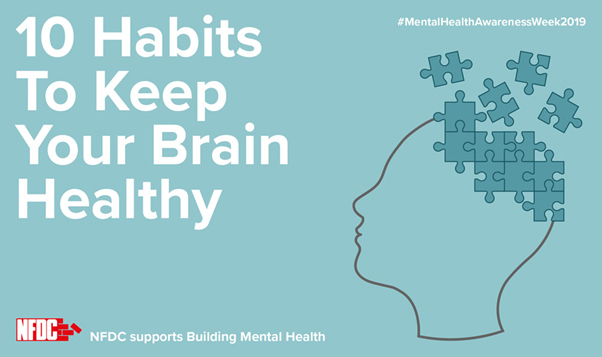NFDC Members: Remember to register for the NFDC wellbeing programme as we will be providing you with more information on all of these tips. Your nominated colleague who attends the Wellbeing Ambassador workshop will also be provided with more details for them to bring back into your business, ensuring everyone in the Industry has the knowledge, tools and techniques to keep their brain healthy and live life to the full.
10 Habits to Keep your Brain Healthy:
- Value yourself: Think about your internal soundtrack, how do you speak to yourself? Work hard to ensure that your internal soundtrack is positive and treat yourself with kindness. Make time for the things you enjoy doing be that socialising with friends and family, playing or listening to music, travelling, reading and so forth. By doing things we enjoy we make ourselves feel better, which will keep your brain healthy.
- Take care of your body: The link between mental and physical wellbeing is undeniable – prioritise a good diet, sleep and fitness will help keep your brain healthy.
- Surround yourself with good people: Evidence shows that people with strong social and family connections are generally healthier than those who lack a supportive network. Building stronger, wider social connections can help you feel happier and more secure and gives you a greater sense of purpose.
- Give yourself: By lifting others, we lift ourselves. If possible, volunteer time to help others, this could be as easy as helping your children with their homework or helping out around the home.
- Learn how to deal with stress: This is a daily challenge as we regularly feel under pressure be that at work, home or even on the commute. Spending a few minutes a day practicing coping strategies such as a one-minute breathing exercise can be beneficial. Try balanced breathing, breathing slightly deeper, 5 seconds in/5 seconds out is considered the most effective method. Remembering to do this at the time you’re feeling overwhelmed, stressed or anxious will help ‘turn the volume down’ on the body’s natural reaction.
- Quiet your mind: Using the breathing exercise mentioned above can help bring a sense of calm and focus. In addition, meditation and mindfulness can help develop a positive outlook.
- Set realistic goals: Have a think about what you’d like to achieve both personally and professionally, aim high but set realistic goals. Remember, Rome wasn’t built in a day!
- Break up monotony: Routines help us be more efficient and enhance our feelings of security, however, sometimes a small change can be beneficial and offer a new perspective or source of enjoyment.
- Drink Sensibly: Sometimes people use alcohol and other drugs to ‘self-medicate’, however, in reality, alcohol and other drugs only aggravate problems such as disrupting sleep meaning when you wake your energy levels are already low.
- Ask for help when you need it: Remember, it’s OK not to be OK. Asking for help is a sign of strength – not a weakness. If you feel like you are struggling speaking to someone will help lift the burden – be that a colleague, friend, family member, charity (such as Mind, the Construction Industry Helpline or the construction industry charity, The Lighthouse Club) or medical professional.
Dave Price, Managing Director,
Vector Equilibrium Ltd
